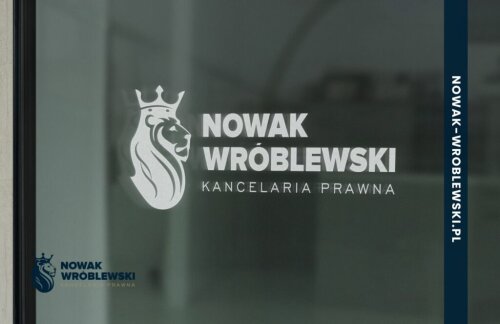Best Administrative Lawyers in Tarnobrzeg
Share your needs with us, get contacted by law firms.
Free. Takes 2 min.
List of the best lawyers in Tarnobrzeg, Poland
1. About Administrative Law in Tarnobrzeg, Poland
Administrative law in Tarnobrzeg governs how local public authorities make decisions affecting residents and businesses. The core rules apply to the city such as the Urząd Miasta Tarnobrzega and the City Council, as well as to higher level bodies in the Podkarpackie region. In Tarnobrzeg, typical matters involve building permissions, zoning decisions, local fines, and access to public information. The legal framework ensures that decisions are issued with due process and allow for challenge if a resident believes a right has been violated.
Public authority actions in Tarnobrzeg follow standardized processes set out in Polish administrative law. The most important procedural code is the Kodeks postępowania administracyjnego (KPA), which lays out how decisions are issued, how to appeal, and the timelines for responses. Local regulations and plans, such as zoning and spatial planning, are implemented through Acts and municipal resolutions, all subject to review in the regional administrative court system.
The everyday experience of administrative law in Tarnobrzeg often involves interaction with municipal departments for permits, public information requests, and compliance matters. Understanding your rights and the proper steps to challenge a decision can help you protect your interests effectively. When in doubt, seeking qualified legal counsel with local experience is prudent.
Deadline for filing an appeal against a local administrative decision is typically 14 days from service of the decision, unless the law provides a different period. This is a general principle found in the Administrative Procedure Code (KPA). ISAP Sejm - KPA
2. Why You May Need a Lawyer
Here are concrete, real-world scenarios Tarnobrzeg residents may face where legal counsel can help navigate administrative law matters:
- Building permit denied in Tarnobrzeg - You applied for a local building permit to extend a home in Tarnobrzeg and the city department issued a negative decision citing plan conflicts. A lawyer can review the decision, gather missing documentation, and prepare an effective appeal to the appropriate authority.
- Local zoning plan objections - The municipal zoning plan affects a small business site you own in Tarnobrzeg. You need to challenge the plan's provisions or seek a modification, which requires procedural steps and precise legal arguments under KPA and planning law.
- Public information request denied - You requested public records from the Urząd Miasta Tarnobrzega about a city procurement. If information is withheld, a lawyer can guide you on remedies under the information access rules and draft enforceable complaints.
- Public procurement dispute - A local procurement process in Tarnobrzeg excludes your bid unfairly. A lawyer can analyze whether procedures were followed, file complaints, and represent you before the relevant authority or court if needed.
- Fines or administrative penalties - Tarnobrzeg imposes a monetary penalty for an alleged regulatory violation. Legal counsel can evaluate proportionality, the basis of the fine, and the proper appeal route to challenge the decision.
- Local health or environmental compliance issues - You face a local environmental compliance notice or a permit condition that requires a formal challenge or request for corrective action, with deadlines and specific evidence requirements.
These scenarios illustrate how administrative law interacts with daily life in Tarnobrzeg. A local lawyer familiar with Tarnobrzeg offices and the Podkarpackie region can help tailor strategies to the city’s procedures and timelines. Consulting a solicitor or attorney with regional experience increases the likelihood of a favorable outcome.
3. Local Laws Overview
The following laws and regulations shape administrative matters you encounter in Tarnobrzeg. They bind both local government and residents in the city and the wider Podkarpackie region.
- Kodeks postępowania administracyjnego (KPA) - the Administrative Procedure Code governing how administrative decisions are issued, changed, and reviewed. This code applies to Tarnobrzeg’s municipal and regional proceedings. Recent amendments have focused on clarifying timelines and access to information. ISAP Sejm - KPA
- Ustawa z dnia 8 marca 1990 r. o samorządzie gminnym - governs the operation of gminas like Tarnobrzeg, including the powers and responsibilities of the City Council, mayor, and administrative departments. It frames how local decisions are made and reviewed. ISAP Sejm - Ustawa o samorządzie gminnym
- Ustawa z dnia 27 marca 2003 r. o planowaniu i zagospodarowaniu przestrzennym - shapes planning and zoning issues in Tarnobrzeg, influencing development approvals and land use. Changes to planning law affect how residents respond to municipal plans and how developers proceed with projects. ISAP Sejm - Planowanie i zagospodarowanie przestrzenne
In Tarnobrzeg, these Acts interact with local administrative practices to govern everyday life. For example, planning decisions rely on the planning law, while the enforcement and review of these decisions follow the KPA. The city’s own regulations must align with national acts, and disputes can escalate to the regional administrative court in the Podkarpackie region.
Executive and regulatory updates are published on government portals and the regional authority sites. For practical purposes, residents should monitor Tarnobrzeg’s city site and the Podkarpackie regional pages for changes that may affect procedures or deadlines. Gov.pl and the national ISAP portal remain key resources for authoritative texts.
For information on public information requests and timelines, the Act on Access to Public Information requires authorities to respond within set timeframes, typically 14 days, with possible extensions for complex requests. Gov.pl
4. Frequently Asked Questions
What is administrative law in Tarnobrzeg?
Administrative law governs how public authorities in Tarnobrzeg make decisions and how residents can challenge them. It covers permits, fines, and information requests. It also includes remedies available before regional administrative courts.
How do I start a formal appeal in Tarnobrzeg?
Start by obtaining the decision you want to appeal. Contact a local lawyer to draft the appeal and identify the correct authority to file with. The appeal must be filed within the deadline specified in the decision.
When should I file an appeal after receiving a decision?
Most administrative appeals in Poland must be filed within 14 days of service of the decision, unless the act specifies a different deadline. Always check the text of the decision for the exact period.
Where do I file an administrative appeal in Tarnobrzeg?
File with the authority that issued the decision or its higher administrative authority. If the matter concerns broader regulatory issues, you may escalate to a regional administrative body in the Podkarpackie region.
Why should I hire a Tarnobrzeg-based lawyer rather than a national firm?
A local lawyer understands Tarnobrzeg offices, staff, and typical procedural expectations. They can navigate city-specific practices, deadlines, and the local court system more efficiently.
Do I need to pay a fee to file an appeal?
Some administrative appeals require a small fee or court costs, while others may be fee-free depending on the act and your status. A lawyer can confirm the exact costs for your case.
Can a non-citizen file an administrative appeal in Tarnobrzeg?
Non-citizens can generally appeal administrative decisions if they are affected by them. The process and documentation may differ, so consult a local attorney for guidance.
What is the difference between KPA and the planning law used in Tarnobrzeg?
KPA governs how administrative decisions are issued and reviewed. Planning law governs land use and zoning and affects development decisions within the city and region.
Is there a quick path to resolve disputes without going to court?
Often, disputes can be resolved through administrative reviews, mediation, or negotiations with the relevant authority. A lawyer can propose the most efficient route based on your case.
Do I need to hire a lawyer for information requests in Tarnobrzeg?
No, but a lawyer can help you craft precise requests, interpret refusals, and pursue remedies if information is wrongly withheld.
What’s the typical timeline from filing to resolution in a building permit appeal?
Timelines vary widely by case and authority. A typical administrative appeal can take several weeks to months, depending on the complexity and workload of the body involved.
What is the role of the Ombudsman in Tarnobrzeg related to administrative matters?
The Ombudsman can review complaints about public authorities’ handling of cases and protect citizens’ rights in administrative processes. They operate at national level and provide guidance on rights related to administrative actions.
5. Additional Resources
Use these official resources for authoritative guidance, forms, and up-to-date procedural information related to Administrative law in Tarnobrzeg:
- Urząd Miasta Tarnobrzega - the city government office where most local decisions originate and where you can request records, permits, and public information. https://www.tarnobrzeg.pl
- Wojewódzki Sąd Administracyjny w Rzeszowie - handles appeals and reviews of administrative decisions within the Podkarpackie region. https://www.wsa-rzeszow.pl
- Rzecznik Praw Obywatelskich - national ombudsperson providing guidance and handling complaints about public authorities, including administrative processes. https://www.rpo.gov.pl
6. Next Steps
- Identify your issue clearly - Write a concise summary of the decision, the impact on you, and the relief you seek. Do this within 3-5 days of receiving the decision.
- Collect all documents - Gather the decision letter, receipts, related correspondence, and any evidence supporting your position within 1-2 weeks.
- Find a Tarnobrzeg Administrative lawyer - Look for a lawyer with local experience in municipal matters and administrative disputes. Schedule initial consultations within 2-3 weeks.
- Prepare for the consultation - Bring all documents and a list of questions. Expect the lawyer to outline potential strategies and timelines during the first meeting within 1 hour.
- Decide on a course of action - Depending on deadlines, choose whether to appeal, request reconsideration, or negotiate a settlement within 1-2 weeks after the consultation.
- File the appeal or request - Your lawyer will prepare and submit the appeal or information request with the correct authority. Expect a formal acknowledgment within a few days and further action within weeks.
- Monitor deadlines and follow up - Track all relevant deadlines, responses, and any required hearings. Maintain regular contact with your lawyer for updates over the next 1-6 months.
Lawzana helps you find the best lawyers and law firms in Tarnobrzeg through a curated and pre-screened list of qualified legal professionals. Our platform offers rankings and detailed profiles of attorneys and law firms, allowing you to compare based on practice areas, including Administrative, experience, and client feedback.
Each profile includes a description of the firm's areas of practice, client reviews, team members and partners, year of establishment, spoken languages, office locations, contact information, social media presence, and any published articles or resources. Most firms on our platform speak English and are experienced in both local and international legal matters.
Get a quote from top-rated law firms in Tarnobrzeg, Poland — quickly, securely, and without unnecessary hassle.
Disclaimer:
The information provided on this page is for general informational purposes only and does not constitute legal advice. While we strive to ensure the accuracy and relevance of the content, legal information may change over time, and interpretations of the law can vary. You should always consult with a qualified legal professional for advice specific to your situation.
We disclaim all liability for actions taken or not taken based on the content of this page. If you believe any information is incorrect or outdated, please contact us, and we will review and update it where appropriate.










